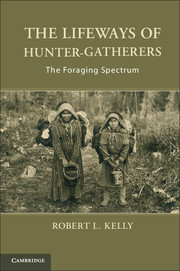Book contents
- Frontmatter
- Contents
- Tables
- Figures
- Preface
- Acknowledgments
- One Hunter-Gatherers and Anthropology
- Two Environment, Evolution, and Anthropological Theory
- Three Foraging and Subsistence
- Four Mobility
- Five Technology
- Six Sharing, Exchange, and Land Tenure
- Seven Group Size and Demography
- Eight Men, Women, and Foraging
- Nine Nonegalitarian Hunter-Gatherers
- Ten Hunter-Gatherers and Prehistory
- Notes
- References
- Index
One - Hunter-Gatherers and Anthropology
Published online by Cambridge University Press: 05 April 2013
- Frontmatter
- Contents
- Tables
- Figures
- Preface
- Acknowledgments
- One Hunter-Gatherers and Anthropology
- Two Environment, Evolution, and Anthropological Theory
- Three Foraging and Subsistence
- Four Mobility
- Five Technology
- Six Sharing, Exchange, and Land Tenure
- Seven Group Size and Demography
- Eight Men, Women, and Foraging
- Nine Nonegalitarian Hunter-Gatherers
- Ten Hunter-Gatherers and Prehistory
- Notes
- References
- Index
Summary
[W]here every man is Enemy to every man…wherein men live without other security, than what their own strength, and their own invention shall furnish them withall. In such condition, there is no place for Industry; because the fruit thereof is uncertain: and consequently no Culture of the Earth; No navigation, nor use of the commodities that may be imported by Sea; no commodious Building; no Instruments of moving, and removing such things as require much force; no Knowledge of the face of the Earth; no account of Time; no Arts; no Letters; no Society; and which is worst of all, continuall feare, and danger of violent death; And the life of man, solitary, poor, nasty, brutish and short.
Political philosopher (Hobbes 1968 [1651]: 186)To date, the hunting way of life has been the most successful and persistent adaptation man has ever achieved.
Anthropologists (Lee and DeVore 1968: 3)Hunter-gatherers play a pivotal role in anthropological theory. Nineteenth-century evolutionists saw them as living fossils of early human society. Emile Durkheim's theories of religion and society relied heavily on Australian Aboriginal culture. A. R. Radcliffe-Brown's studies of the Andaman Islanders and Australian Aborigines were the foundation of his theory of structural-functionalism. Cultural ecology was grounded in Julian Steward's intimate knowledge of western North America's Shoshone and Paiute. Australian Aboriginal ethnography figured prominently in Claude Lévi-Strauss's search for the elementary structures of kinship. In fact, because anthropology's foundation was the idea of a primal society (Kuper 1988), we could almost write the discipline's entire history in terms of hunter-gatherer ethnology (Yengoyan 1979). Hunter-gatherers are the quintessential topic of anthropology (Bettinger 1991).
- Type
- Chapter
- Information
- The Lifeways of Hunter-GatherersThe Foraging Spectrum, pp. 1 - 23Publisher: Cambridge University PressPrint publication year: 2013



